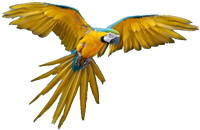- Parrots - Health Care Issues
- Emergency Sick Bird Care
- Beware of Non Stick Cooking Ware
- ECOLI
- Self Cleaning Ovens Are Dangerous for Parrots
- How to Deal with Plucking
Emergency Sick Bird Care
Below are the most important factors to consider when you need to provide supportive care to a sick or injured bird.
1. Heat
2. Humidity
3. Fluids
4. Nutrition
5. Quiet/Level of Activity
 1) The body temperature of birds is about 104 degrees and they use lots of their energy and metabolic resources to retain it at this level. So the best and the most important thing you can do for your sick bird is to help support its temperature, so that it could use more energy to recover quicker. The minimum acceptable temperature is 85 degrees, however 90 degrees is preferable. It is recommended to turn up the heat past 85 until you notice the bird begins to pant, then slowly reduce the heat until it stops panting. When the bird is getting better, make sure you lower the temp gradually for about 5 degrees a day, until back to room temp.
1) The body temperature of birds is about 104 degrees and they use lots of their energy and metabolic resources to retain it at this level. So the best and the most important thing you can do for your sick bird is to help support its temperature, so that it could use more energy to recover quicker. The minimum acceptable temperature is 85 degrees, however 90 degrees is preferable. It is recommended to turn up the heat past 85 until you notice the bird begins to pant, then slowly reduce the heat until it stops panting. When the bird is getting better, make sure you lower the temp gradually for about 5 degrees a day, until back to room temp.
2) Humidity is of vital importance if the bird has respiratory illness, as it helps make breathing easier. The best option is vaporizer, but a humidifier will be fine as well. If the bird is just physically injured and has no respiratory illness humidity is not essential. Typical signs of respiratory involvement include: wheezy or bubbly noises in the breathing; breathing with difficulty (if the bird has problems with breathing the tail will move noticeably when it breathes); discharge from nostrils; beak held open when the bird is breathing but not panting.
 3) Dehydration should be avoided. Lack of hydration may cause the temperature to rise and digestion may be disrupted. If the situation is serious a vet may even administer fluids under the skin, but at home bird owners can use oral fluids which are also very helpful. You can give fluids from your finger, or use a spoon or a syringe. Some examples of fluid to give are: D5W (medical glucose/saline solution), some infant electrolyte solution, apple or grape juice, bottled water with a little bit of sugar or honey. Avoid using Gatorade as it's too salty!
3) Dehydration should be avoided. Lack of hydration may cause the temperature to rise and digestion may be disrupted. If the situation is serious a vet may even administer fluids under the skin, but at home bird owners can use oral fluids which are also very helpful. You can give fluids from your finger, or use a spoon or a syringe. Some examples of fluid to give are: D5W (medical glucose/saline solution), some infant electrolyte solution, apple or grape juice, bottled water with a little bit of sugar or honey. Avoid using Gatorade as it's too salty!
4) To maximize the amount of energy necessary for the bird to fight the illness make sure it gets enough food. A sick bird needs food rich in carbohydrates that is easy to digest, such as baby food, hand-feeding formula, infant rice cereal, cream of wheat, ground-up pellets mixed with juice, any fruit juice except orange, molasses, honey. If your bird refuses to eat when ill, you will have to hand feed or even force feed it. Do remember that birds can starve to death within 48 - 72 hours when they are healthy, and even quicker when ill. Because of poor nutrition the bird may fail to recover from the illness.
5) Make sure your ill or injured bird stays quiet and inactive. The cage should be in semidarkness and without toys and ladders to climb. Consider moving your bird to a quiet part of the house to minimize noise.
If you give antibiotics to your bird remember that they also kill the "friendly" bacteria that are good for the digesting system. So it is important to provide your pet with yogurt, lactobacillus supplement, or acidophilus. This will not only improve digestion but will also help prevent backlash Candida (yeast) infections. If you see any white spots in mouth or on tongue, you will have to add antifungal medicines as well.
